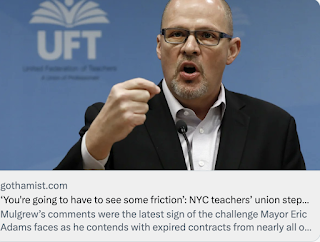This has been adapted from a thread I wrote on Twitter. You can read that by clicking here and tapping 'show thread'
In order to more fully describe the flex, I should probably explain why this teach-in was such a smart move…

 Part 3. A brilliant stroke
Part 3. A brilliant stroke 

Of course what happened was a teach-in. But beneath the surface, what occurred wasn’t about a teach-in at all. The Labor Movement in America has long been on a terrible decline. In New York, those who have worked toward its resurgence have been slowed by laws, decisions, contracts or cultures that have prevented unions from ever reaching step 1 (I talk about the three steps here).
One example about being slowed by skewed law is Sam Amato, a unionist who was fired from Starbucks. His firing was legal here in New York State. Had his colleagues not staged a walk-out in support of him, we wouldn't know his name today.
NY Teachers have their own law: The Taylor Law. It's better than the law they had before 1968, but it is so harsh that *any* service that would otherwise normally be performed cannot stop without it being against the law. This means that the UFT can’t even call for a work action where all teachers stop grading HW at night w/out it being illegal. This frustrates any notion of resurgence. Here is what the very radical Workers' World published about the Taylor Law's "Work to Rule" language:
The Taylor Law in New York State prohibits public employee unions from conducting strikes, or even job actions like “work to rule.” Violation of the law leads to fines, sanctions against the union and even jail for union leaders. But there is no pressure on employers to bargain fairly with employees.
And even if they do, over a job action? At work? During the hours covering the general work day? This is next to impossible here. The powers that be have carefully crafted an entire apparatus that keeps teacher unions' hands tied.
Yet UFT organizers found a way to do it anyway.
If we had met to discuss a strike, this work action would be illegal. If we had discussed a sickout or other work stoppage, this would have been illegal. But, with the strategy of teachers teaching teachers during work, the UFT organizers found a legal middle ground where they could stage a work-based action that *also* fulfilled its duties to the law.
Management didn’t see that coming.
Most of us didn’t.
Some in oppo still don’t.
But it happened.
This is a precedent. This is a brand new language of unionism. It isn't as harsh as some of us would like to act but it was legal, which means we (or any union) can do it again. No reasonable manager in any industry could stop something like this from happening. Other locals in other industries are going to find ways to emulate this *perfectly legal and new strategy of finding (legal) ways to perform wide scale job actions (legally).
But that’s only part of what actually happened on Monday …
It’s said that when James Madison read the decision in Marbury vs. Madison in 1803, he paced up and down the president’s office growling “wrong wrong wrong, but the life of me, I can’t understand why”. Madison was a crankly, but brilliant person who wrote the constitution and most of the Federalist papers but the decision was so brilliant, even he didn't understand it at first.
That's because the power of that decision lied in its consequences.
In denying itself the power to issue a writ of Mandamus, the US Supreme Court was able to do something far more powerful: it got to be the one to tell Congress “No”. It was a brilliant stroke.
Something somewhat similar has happened here.In performing the innocent and harmless act of a teach-in, more than 500 principals were informed by their staff that it was happening —and the teachers and their union were the ones informing them. (Again, this happened across all 5 boroughs. 73% of all UFT members out in Queens were part of it.
This is subtle but it’s a profound shift in the dynamic between the UFT and the City of New York and the DOE. Literally all of the rules and laws and customs are designed to stop exactly that from happening city-wide. But it happened anyway. It was legal, professional, ethical and honorable.
Yes. Last Monday, tens of thousands of New York City’s Smartest freaked out their bosses by teaching each other; as a union thing. And it was cool ).
).
 ).
). Generally, when you ask to do something, your will to do it is dependent on the will of another person to grant you permission to do it. But if you inform a person you're going to do something, well your will doesn't depend on theirs so much, does it? Just as in Marbury, The flex was in the power of being the ones to say so.
Navigating the legalities of getting there was smart enough. But convincing tens of thousands of teachers to say “we *are* doing this” as well? That was a brilliant stroke.
And somewhere between 17,500 and 34,000 thousand teachers teaching teachers, and the union brothers and sisters who love and support them, allowed Mike Mulgrew to toughen up his language and flex through the press. This headline you see here isn't power. It’s strength (step 3).




No comments:
Post a Comment